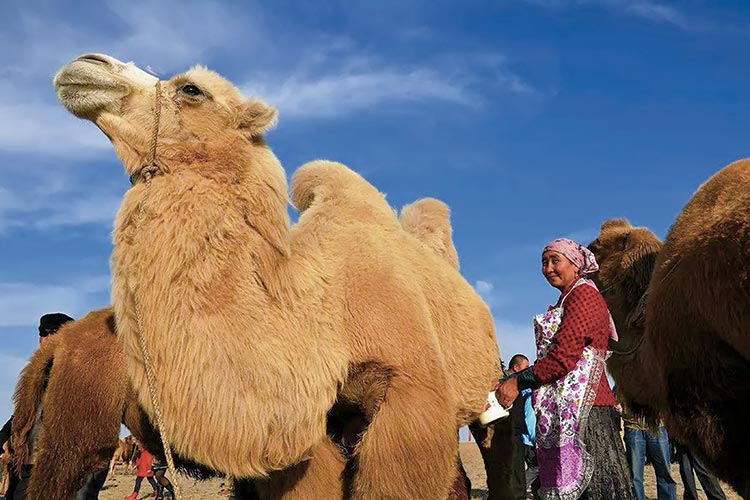Written by: Zhou Ye, Xinhua
Posted on: October 17, 2018 |  | 中文
| 中文
Camels of Fuhai County
In the Xetaral Village of Fuhai County, North Xinjiang, Aman Muhamat, has just returned from the Third Camel Commendation Conference of the Frontier Herdsmen, and places the honorary certificate on the top of the cabinet. “These two certificates for my father and I, together with an award of 30,000 Yuan, have been issued on the commendation conference,” says Aman Muhamat.
As the most important means of transportation on the ancient Silk Road, camels were indispensable to herdsmen and also impressed people in general. The sounds of the camel bells were typically heard along the Silk Road.
Kazakhs account for 45.7% of the total population of Fuhai County, a key city along the northern route of Silk Road in Altay Prefecture. It is a tradition for herdsmen to raise camels that once acted as the key transportation means for Kazakh herdsmen to move between their seasonal pastures. As society develops, the wide and even driveway makes it possible for them to use vehicles for seasonal migration, and thus camels have also changed their role from long-distance transportation means to other means of production.
Aman Muhamat’s two rows of houses, in the east-west and south-north direction, join together in the bright yard, with motors and cars parked outside. A tiled floor, full sets of modern electronic appliances, and the glass corridor wall in front of the house, reflect a soft orange light in the sunset glow, all of which were no easy task for Aman Muhmat to achieve.
The idea that camel milk can be sold to other areas of China after processing had never occurred in the mind of his father, Muhamat Xiat, 64 years old, who had raised camels for dozens of years. “Many people in other areas didn’t even know that camels could give milk, since it gets spoiled easily. Barrels full of camel milk would even explode when they were too hot during transportation.”
Muhamat Xiat once raised camels for the People’s Commune members and later for himself, for the seasonal migration of herders and their animals. He tried to sell camel milk in the past, but it did not bring him much income. He had never expected to raise more than 100 camels, which would pull him out of poverty. “In the past, when we migrated between pastures, we only had to raise four or five camels for transportation, otherwise we couldn’t afford them. Located at the roadside, any passerby would ask for a little milk when they saw the beautiful camels walking in the yard and they paid for it. Back in 2004, I sold the camel milk with a motorcar around the town. In 2006, Wangyuan Company established a camel milk factory in Fuhai, which required a great amount of camel milk, and I bought a female camel with a loan from the bank, and thus began to raise more camels. Now, I can earn an annual income of about 300,000 Yuan and became the first herdsman in the village to become well-off through camels.”

In the late afternoon, he milks camels just as his wife does every day. Carrying a silver-coloured bucket and a bag of towels, his wife walks towards the camel barn. Meanwhile, Aman Muhmat helps to drive the female camels together. “The way we milk the camels now is different from what we did in the past. Wangyuan Company asked us to pass an examination for hygiene certificate of camel milk, and milking one camel means using one clean towel, and we are asked to put these and other tools in a special house. Now, we are used to these regulations and produce qualified camel milk for them.” Founded in 2006, Xinjiang Wangyuan Biotech Group has helped to increase the number of camels in Fuhai from 3000 to over 20,000. Milk suppliers have also reached out to more than 5000 households in prefectures of Altay, Tacheng, Yili and other areas. As a result, at least 2000 local poverty-stricken households have been lifted out of poverty.
Translated by Xin Yuan
You may also like: